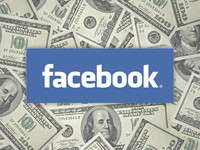Why did the Facebook IPO fail? Did it?

While the success of Facebook may have seemed like it happened overnight, it was nearly a decade in the making. The same is true for many seemingly ‘overnight’ successes. When Facebook went public last Friday, many people were expecting a stock price that would soar well above the initial price of $38 a share. This was clearly not the case… The flop led many analysts to think the IPO price was too high. $38 a share priced Facebook at over 100 times its current annual earnings, a number which is far higher than other companies valued at around $100 billion.

(Thanks to CNBC for the image)
Many think the problem with the IPO was that Facebook has already reached its potential and will not grow anymore, making it a risky investment. This is a stark contrast to the recent IPOs of LinkedIn and Groupon. LinkedIn stock rose 109 percent last May when it went public, while Groupon shares rose 31 percent on the day of its IPO last November. The difference is that both of these companies are largely viewed as on the way up with plenty of potential. The IPOs were viewed as ground floor rather than the ceiling. The investors just wanted to get the deal “done” while other investors felt like the deal was getting done to them. We must also remember there is an element of greed to all of this, when investors get greedy and it backfires. We have all witnessed what corporate greed can do at some point in recent history (to put it lightly). It kind of takes me back to something said to me as a child…
Pigs get fat and hogs get slaughtered.
Yup. Old country wisdom can be very applicable sometimes. If stock debuts at the top price, where is it supposed to go from there? They should’ve given themselves some room to grow given current market conditions. I will be interested to see how they will work to rebuild the momentum they once had. It’s almost like your first trip to Disneyworld or for those of us who are a bit older, your first time getting something you order in a catalogue through the mail – like sea monkeys or x-ray glasses. Expectations get to a certain level they become inherently unrealistic.
One of the biggest problems Facebook has is that nearly all of its revenue is from advertisements. This works great if everyone viewed their Facebook page from a normal Internet browser, but more people are managing their Facebook from mobile devices. Facebook does not have a solid mobile app or advertisements on its mobile web pages, costing them revenue every time someone uses that instead of a normal desktop web browser. No bueno.The second issue with their ad platform is that they haven’t figured out when and how to serve ads appropriately. As a seasoned marketer I enjoy skewing the data of others. Call me evil, but I have listed my age on Facebook as 82. Oh the fun I have had witnessing ads for gout, dentures, etc. I’ve been able to learn a bit about where and how they pull data for the ads they serve to you. It’s random at best. Just now I looked at my home page on Facebook and got these two ads:

Huh???
I have never played a game on Facebook, ever. That’s ok. At least I am not seeing adult diaper ads anymore! I understand that your age can put you in certain category buckets, however it cannot be such a dominating force. Some further thought needs to be put into how Facebook ads are served to people, and when.
Many financial experts also think that Facebook could still be a fad, and they will continue to point to MySpace and what happened when Facebook came out. It is within the realm of possibility that another social networking site could come out and take users away from Facebook, and without as many users, Facebook would lose revenue. User adoption has started to drop off for Facebook and they have continued to fail at developing a competitive mobile application. If Facebook does not nail down the mobile app issue, they can kiss their market share good-bye.


